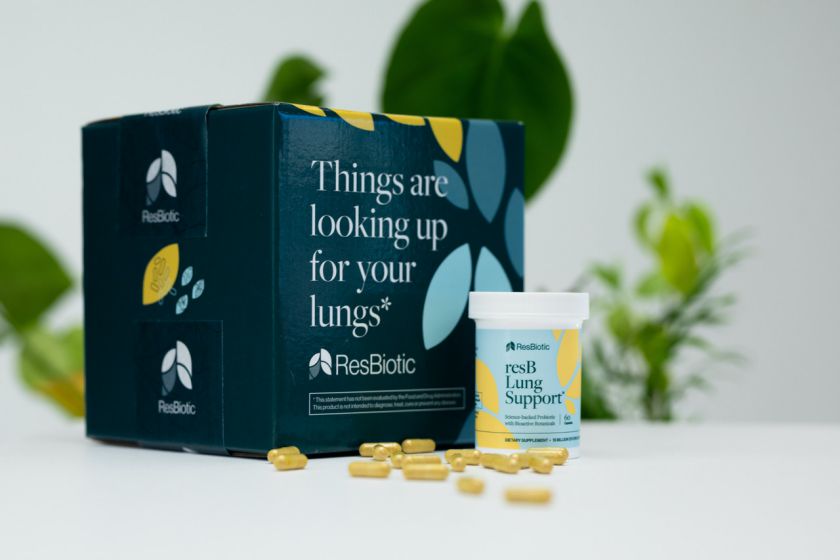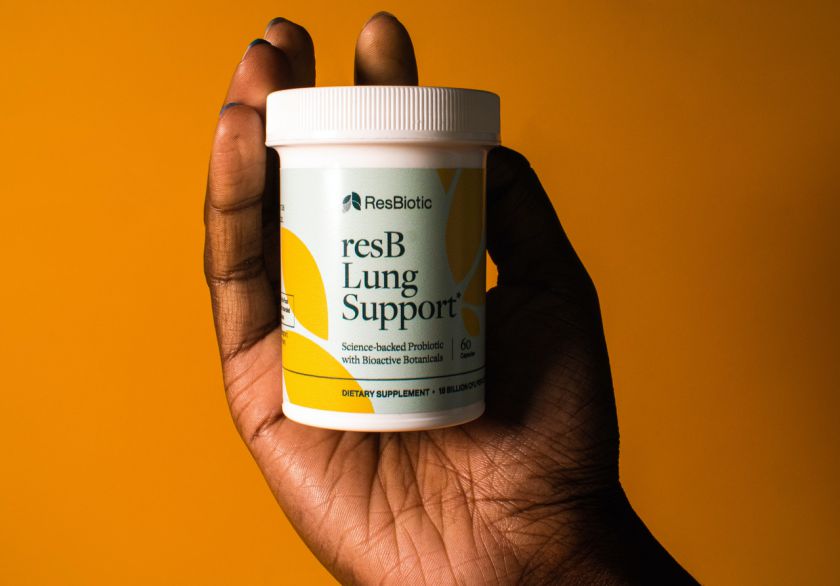Every breath you take … can improve with ResBiotic

Although there is an influx of “preventative” cures for health concerns most don’t know they have, very few can claim that the formulation is rooted in science. However physician–scientist C. Vivek Lal can, as the entrepreneur who breathed life into ResBiotic, the first science-backed probiotic for lung health. The founder and CEO explains his journey into medicine started at 17 years old when his mother actually encouraged him to take a pre-medical test in the hopes that he’d become a doctor one day. He not only passed the test with flying colours, but was admitted to medical school. ‘I hadn’t exactly envisioned that for myself, but helping others quickly became a passion and led me to where I am today, an ICU physician and pulmonary biologist at the University of Alabama at Birmingham along with a company founder,’ he says.

The recommended dose of ‘ResB’ is two capsules per day, based on the dosages studied in clinical trials. However, Dr Lal points out that in order to integrate it into a daily routine, it is important to remember this process differs from person to person. Although he generally suggests that the average user takes one capsule in the morning and one in the evening, with or without food, he suggests splitting the dose and taking one capsule twice to introduce ResB, to get yourself acclimatized. Like other probiotics, the key to effectiveness is consistent daily use. Furthermore, he suggests people try ResB for at least 60 to 90 days as the systemic benefits of probiotics have been known to build up over time.
‘For decades, people assumed that healthy human airways are sterile, which is a myth we helped bust when we started looking at the microbiome at birth,’ he says. ‘Exploring where the airway microbiome comes from, and whether it could play a predictive role in health and disease, also led us to explore how the gut bacteria actually communicate with the lungs and how modulating the gut bacteria can affect the lungs with respect to general structure and function. I guess you could say ResBiotic grew out of a myth-buster that you’ve probably never thought much about.’
As the roll-out continues, Dr Lal shares his thoughts on why everybody should treat their respiratory system with the same respect as they do their digestive health, which still sits in a brighter spotlight–for now.
Lucire Rouge: Even if you are in good shape, and have a healthy respiratory system, why is this a necessity rather than an option?
Dr C. Vivek Lal: We often take our lungs for granted, and there’s a huge misconception that lung health can be pushed aside unless you have a chronic lung condition. It’s always necessary to care for your vital organs and important to do so while they’re still healthy. Beyond that, the ResB Lung Support formula also supports healthy digestion and immune function.
How does a supplement improving respiratory health actually work, from the moment you take it to how it metabolizes?
When we talk about oral probiotics for lung health, we’re talking about [supplements] that target the gut–lung axis. This concept was first introduced when scientists observed gut microbiome composition correlating with lung health and disease. There’s a dynamic cross-talk between epithelial cells, immune cells, and microbiota happening non-stop in your gut and lungs. Metabolites, inflammatory mediators, and immune modifying molecules produced by the gut bacteria travel to the lungs and other organs through the blood and lymphatics.
What were your personal experiences (as a doctor or a patient) that led you on the path to formulate and develop ResBiotic?
ResBiotic came about from years of research at my lung microbiome lab and our chief medical officer’s lung protease biology lab at the University of Alabama at Birmingham. The company actually began at the bedside with the observation at the bedside that the airways exhibit a microbiome signature as early as when a baby is born. It was a rigorous process where we translated our observations of the microbiome and dysbiosis characteristics into novel mice models. We then began exploring the gut–lung axis concept and how gut bacteria actually communicates with different organs—in our case, the lungs. From there we took the technology out of the university and created what is now ResB Lung Support.
What are the most common myths about respiratory health, and how is the ResBiotic introduction helping dispel them?
Lung health risks are so often invisible. But because everybody breathes, our mission is to help people care for and celebrate their lungs, in a stigma-free, accessible way. Two other common myths are that if you don’t have a respiratory condition, there’s no need to care for your lungs, and that you’re only at risk of respiratory issues if you smoke. Many people are surprised to learn that [per the CDC] an estimated one in four people with COPD are not smokers. Many people also don’t realize just how much they’re exposed to pollutants, whether from car exhausts, wildfire smoke, or nearby factories.
The idea of a respiratory-improvement supplement is a new thing for many people, so what is the process involved in introducing this to the market?
Before getting the word out at industry conferences, on social media, and with interviews like this one, we made sure there was a strong foundation of educational resources at resbiotic.com. [To make the ideas accessible, the] team has created a simple animation to explain the basic mechanisms of the gut–lung axis on our homepage, synthesized the many strain-specific clinical studies on our product page, chronicled a brief history of gut–lung axis research on our science page, developed an in-depth FAQ page, coordinated a series of #AskTheScience posts on our blog—the list goes on and on.
Who exactly is a candidate for this supplement? What’s the best way to integrate it into a daily routine for this person, or group?
We joke amongst ourselves that anyone who breathes should take ResB, but we definitely have customer concentrations in groups who actively think about their respiratory health. Athletes, folks who smoke or have smoked, individuals with seasonal breathing issues or who are prone to respiratory infections, and people who live in areas affected by pollution or wildfires are all great candidates for ResB. Some of our customers do have respiratory conditions and take ResB as a nutritional complement to their treatment plan. We also have a number of customers who were taking a probiotic for digestion and switched to ResB to get the additional benefits to lung and immune health. However, as it has not been tested in kids or pregnant or lactating women, so we do not recommend it for those groups at this time.
With so many pre-and probiotic supplements on the market, what makes ResBiotic different in terms of inclusion in one’s diet and function in improving health?
Our proprietary blend is a unique mix of live probiotic bacteria and bioactive botanicals, which we tested independently and as a blend to maximize lung structure and function benefits. The probiotic strains in ResB Lung Support are also clinically proven and have been used in several clinical trials for digestion, immune health, and respiratory health. We do not shy away from sharing the science behind our product, and hope to lead the charge in consumers expecting more from their probiotics.











